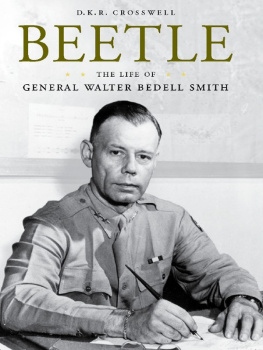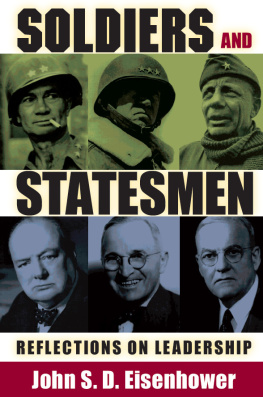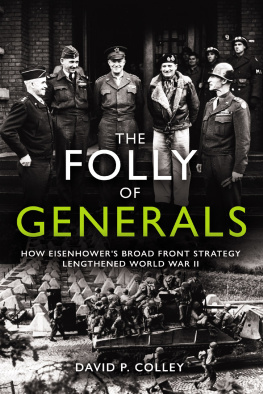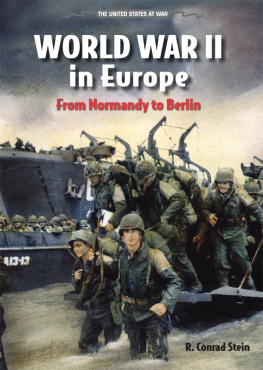Jacob L. Devers
AMERICAN WARRIORS
Throughout the nations history, numerous men and women of all ranks and branches of the U.S. military have served their country with honor and distinction. During times of war and peace, there are individuals whose exemplary achievements embody the highest standards of the U.S. armed forces. The aim of the American Warriors series is to examine the unique historical contributions of these individuals, whose legacies serve as enduring examples for soldiers and citizens alike. The series will promote a deeper and more comprehensive understanding of the U.S. armed forces.
SERIES EDITOR: Roger Cirillo

JACOB L. DEVERS
A GENERALS LIFE
JAMES SCOTT WHEELER
FOREWORD BY RICK ATKINSON

Due to variations in the technical specifications of different electronic
reading devices, some elements of this ebook may not appear
as they do in the print edition. Readers are encouraged
to experiment with user settings for optimum results.
Copyright 2015 by The University Press of Kentucky
Scholarly publisher for the Commonwealth,
serving Bellarmine University, Berea College, Centre College of Kentucky, Eastern Kentucky University, The Filson Historical Society, Georgetown College, Kentucky Historical Society, Kentucky State University, Morehead State University, Murray State University, Northern Kentucky University, Transylvania University, University of Kentucky, University of Louisville, and Western Kentucky University.
All rights reserved.
Editorial and Sales Offices: The University Press of Kentucky
663 South Limestone Street, Lexington, Kentucky 40508-4008
www.kentuckypress.com
All maps appear courtesy of the U.S. Army, Center for Military History.
Library of Congress Cataloging-in-Publication Data
Wheeler, James Scott, author.
Jacob L. Devers : a generals life / James Scott Wheeler ; foreword by Rick Atkinson.
pages cm. (American warriors)
Includes bibliographical references and index.
ISBN 978-0-8131-6602-5 (hardcover : alk. paper)
ISBN 978-0-8131-6603-2 (pdf : alk. paper)
ISBN 978-0-8131-6604-9 (epub : alk. paper)
1. Devers, Jacob L. (Jacob Loucks), 1887-1979. 2. GeneralsUnited StatesBiography. 3. World War, 1939-1945Biography. 4. United States. ArmyBiography. I. Title.
E745.D48W48 2015
355.0092dc23
[B] 2015028410
This book is printed on acid-free paper meeting the requirements of the American National Standard for Permanence in Paper for Printed Library Materials.

Manufactured in the United States of America.

| Member of the Association of
American University Presses |
To Jane Ennis Wheeler
and
Georgie Lyon Devers,
and to all army spouses
Contents
by Rick Atkinson
Photographs follow
Foreword
No senior American general from World War II has been forgotten more quickly or with less justice than Jacob Loucks Devers. In the final drive to liberate western Europe from Nazi occupation, he was one of only three army group commanders under Dwight D. Eisenhower (the others being the more enduringly famous Bernard Law Montgomery and Omar N. Bradley). Among top Allied commanders, no one showed a surer touch than Devers at handling recalcitrant foreign subordinates. His Sixth Army Groupan amalgam of American and French forcesswept into southern France and up the Rhne River valley, traversing the Vosges Mountains in the early winter of 1944 and standing on the west bank of the Rhine four months before Montgomery and Bradley would reach that milestone. That feat alone should have guaranteed Deverss reputation, even without his signal contributions to the Allied cause earlier in the war and in the subsequent conquest of southwestern Germany and western Austria.
James Scott Wheeler has given us the first complete portrait of Devers, from his boyhood in central Pennsylvania to West Pointwhere his classmates included George S. Pattonto his service as a young officer during World War I and then in the struggling, neglected interwar U.S. Army. A gifted artilleryman and administrator, Devers was among the youngest army officers to become a general. As chief of the Armored Force for two years, he helped modernize a tank arm rife with traditionalists nostalgic for the horse; under his energetic, creative supervision the force grew from two armored divisions to sixteen, plus sixty-three separate tank battalions. I made a lot of mistakes today, he would tell subordinates during maneuvers. So did you. In May 1943 he became commander of American forces in Europe and remained in that post until Eisenhower arrived in London from the Mediterranean to lead Operation Overlord, the invasion of Normandy. Devers then moved south, overseeing U.S. forces in Italy and the Allied juggernaut of twelve American and eleven French divisions that eventually cleared Alsace, reduced the Colmar pocket, jumped the Rhine, and crushed the last enemy diehards in the spring of 1945.
Wheelers comprehensive account documents all this and more, including how a capable and decisive commander also had a knack for provoking the enmity of his peers. Devers and Mark W. Clark, the senior U.S. field commander in Italy, detested each other to the point of not speaking. Former classmate Patton called Devers a very small caliber man, while Bradley dismissed him as egotistical, shallow, intolerant, not very smart, and much too inclined to rush off half-cocked. Eisenhower, in a private assessment for the Pentagon, ranked Devers twenty-fourth among thirty-eight senior American generals in Europe. He has not, so far, Eisenhower wrote, produced among the seniors of the American organization here the feeling of trust and confidence that is so necessary to continued success.
Surely such disparagement sold the man short. The top American airman in the Mediterranean, Lieutenant General Ira C. Eaker, considered Devers the ablest commander I saw in the war. His talent for reconciling national differences and forging an effective Allied military coalition anticipated the skills needed by successful officers of a later generation. He was an innovative, forceful leader whose role in the final victory over the Third Reich was consequential if not profound.
Jake Devers lived a long, eventful life, but by the time he died in October 1979, at age ninety-two, that life was already being forgotten by the country he had served well. Now he has the biography he deserves.
Rick Atkinson
Introduction
Jacob Loucks Devers was the second highest ranking American general to serve in the European theater of operations (ETO) during the Second World War. Only General Dwight D. Eisenhower was senior to him. Devers was the commanding general of two American theaters of operations during the warthe European theater in 1943 and the Mediterranean theater in 1944. He finished his service in Europe as commanding general of Sixth Army Group, one of Ikes two American army groups in France. The other, Twelfth Army Group, was commanded by Omar Bradley. Devers was promoted to full general before Bradley was, and after the war he commanded the Army Ground Forces in the United States. He retired in 1949 after forty years of service.
Next page












